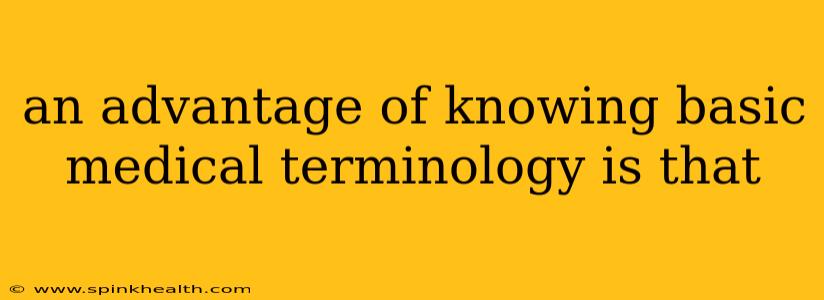An Advantage of Knowing Basic Medical Terminology: Unlocking a World of Understanding and Empowerment
Imagine this: you're at the doctor's office, a whirlwind of medical jargon swirling around you. The doctor mentions "hypertension" or explains a "laparoscopic procedure." Feeling lost and overwhelmed? Knowing basic medical terminology can transform this experience from confusion to clarity, offering a significant advantage in numerous aspects of your life. It's the key that unlocks a world of understanding and empowers you to take control of your health journey.
Let's delve into why understanding even fundamental medical terms is so beneficial:
1. Improved Communication with Healthcare Professionals:
This is arguably the most significant advantage. When you understand terms like "diagnosis," "prognosis," and "symptomatic," you can actively participate in conversations with your doctor, nurses, and other healthcare providers. Instead of passively receiving information, you can ask clarifying questions, ensuring you fully grasp your condition, treatment plan, and potential risks. This leads to better informed decisions about your health.
2. Enhanced Understanding of Medical Information:
Navigating the world of medical information – websites, articles, pamphlets – becomes much easier. You can decipher the complex language often found in patient education materials, making it easier to understand your health conditions and treatment options. This empowers you to research effectively and make informed decisions about your care.
3. Increased Confidence and Reduced Anxiety:
The fear of the unknown is a significant contributor to anxiety surrounding medical issues. Understanding basic medical terms helps dispel this fear. When you understand what your doctor is saying, you feel more confident and less anxious about your health and treatment. This is particularly important during stressful medical situations.
4. Better Self-Advocacy:
Knowing medical terminology allows you to advocate effectively for yourself. You can articulate your concerns and needs more clearly to healthcare professionals, ensuring your voice is heard and your specific requirements are addressed. This is crucial for managing chronic conditions and obtaining optimal care.
5. Improved Health Literacy:
Health literacy is the ability to understand and use health information to make informed decisions. A solid understanding of medical terminology is a cornerstone of strong health literacy. This contributes to better health outcomes and a more proactive approach to maintaining wellness.
6. Career Advancement:
While not directly related to personal health, knowing medical terminology can significantly enhance career prospects in various fields, including healthcare administration, medical research, insurance, and even journalism. It opens doors to opportunities that might otherwise be inaccessible.
What are some common medical terms everyone should know?
This is a broad question, but some fundamental terms include: diagnosis, prognosis, symptoms, treatment, prescription, allergy, infection, inflammation, chronic, acute. Understanding these foundational terms provides a solid base for understanding more complex medical concepts.
How can I learn basic medical terminology?
There are many ways to learn! Online courses, medical dictionaries, and even medical TV shows (though use them with caution and always double-check information with a professional!) can all help. The key is consistent learning and application of these new terms.
In conclusion, knowing basic medical terminology is not just about memorizing words. It's about gaining control over your health journey, improving communication with healthcare professionals, and ultimately, making more informed decisions about your well-being. It's an investment in yourself that yields significant dividends in knowledge, confidence, and empowerment.

